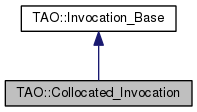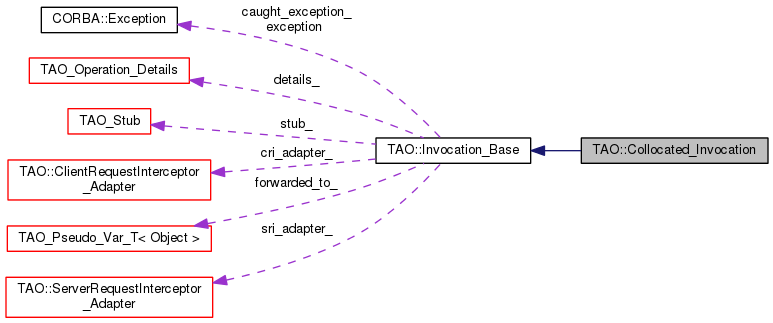|
TAO
2.1.3
|
All Classes Namespaces Files Functions Variables Typedefs Enumerations Enumerator Friends Macros Pages
|
TAO
2.1.3
|
Class for Collocated invocations. More...
#include <Collocated_Invocation.h>


Public Member Functions | |
| Collocated_Invocation (CORBA::Object_ptr t, CORBA::Object_ptr et, TAO_Stub *stub, TAO_Operation_Details &detail, bool response_expected=true) | |
| Constructor used by TAO::Invocation_Adapter. | |
| Invocation_Status | invoke (Collocation_Strategy strat) |
 Public Member Functions inherited from TAO::Invocation_Base Public Member Functions inherited from TAO::Invocation_Base | |
| virtual | ~Invocation_Base (void) |
| TAO_Stub * | stub (void) const |
| Accessor and mutator methods. | |
| CORBA::Object_ptr | forwarded_reference (void) |
| void | forwarded_reference (CORBA::Object_ptr o) |
| Accessor and mutator methods. | |
| TAO_Service_Context & | request_service_context (void) |
| Accessors for the service context list. | |
| TAO_Service_Context & | reply_service_context (void) |
| Accessor and mutator methods. | |
| CORBA::Object_ptr | steal_forwarded_reference (void) |
| Return the forwarded object location by loosing ownership. | |
| CORBA::Object_ptr | effective_target (void) const |
| Return the effective target of the invocation. | |
| CORBA::Object_ptr | target (void) const |
| Return the target object. | |
| CORBA::Boolean | response_expected (void) const |
| Does this invocation return a response? | |
| GIOP::ReplyStatusType | reply_status (void) const |
| Accessor of reply_status of the invocation. | |
| void | reply_status (GIOP::ReplyStatusType s) |
| Mutator of reply_status of the invocation. | |
| TAO_Operation_Details & | operation_details (void) |
| The operaton details of the invocation. | |
| size_t & | stack_size (void) |
| CORBA::Exception * | caught_exception (void) |
| The client requestor adapter. | |
| TAO::Invocation_Status | invoke_status (void) const |
| Invocation status. | |
| void | invoke_status (Invocation_Status s) |
| Mutator to set the invocation status. | |
| PortableInterceptor::ReplyStatus | pi_reply_status (void) const |
| The client requestor adapter. | |
| bool | is_remote_request () const |
Private Member Functions | |
| Collocated_Invocation (void) | |
Additional Inherited Members | |
 Public Attributes inherited from TAO::Invocation_Base Public Attributes inherited from TAO::Invocation_Base | |
| void exception CORBA::Exception * | exception |
| Change the exception status. | |
 Protected Member Functions inherited from TAO::Invocation_Base Protected Member Functions inherited from TAO::Invocation_Base | |
| Invocation_Base (CORBA::Object_ptr otarget, CORBA::Object_ptr target, TAO_Stub *stub, TAO_Operation_Details &op, bool response_expected, bool request_is_remote) | |
| Invocation_Status | send_request_interception (void) |
| Invocation_Status | receive_reply_interception (void) |
| Invocation_Status | receive_other_interception (void) |
| PortableInterceptor::ReplyStatus | handle_any_exception (CORBA::Exception *e) |
| PortableInterceptor::ReplyStatus | handle_all_exception (void) |
| The client requestor adapter. | |
 Protected Attributes inherited from TAO::Invocation_Base Protected Attributes inherited from TAO::Invocation_Base | |
| TAO_Operation_Details & | details_ |
| The operation details on which we are operating on. | |
| CORBA::Object_var | forwarded_to_ |
| Forwarded object reference. | |
| bool | response_expected_ |
| Is response expected? | |
| GIOP::ReplyStatusType | reply_status_ |
| A GIOP reply status of the invocation. | |
| ClientRequestInterceptor_Adapter * | cri_adapter_ |
| The client requestor adapter. | |
| ServerRequestInterceptor_Adapter * | sri_adapter_ |
| The client requestor adapter. | |
| size_t | stack_size_ |
| The client requestor adapter. | |
| TAO::Invocation_Status | invoke_status_ |
| The client requestor adapter. | |
Class for Collocated invocations.
| TAO::Collocated_Invocation::Collocated_Invocation | ( | CORBA::Object_ptr | t, |
| CORBA::Object_ptr | et, | ||
| TAO_Stub * | stub, | ||
| TAO_Operation_Details & | detail, | ||
| bool | response_expected = true |
||
| ) |
Constructor used by TAO::Invocation_Adapter.
| t | The target on which invocation first started. |
| et | The effective target in which this invocation is now flowing |
| stub | Stub for effective target et |
| detail | operation details of the invocation including the service context list |
| response_expected | flag to indicate whether the operation encapsulated by detail returns a response or not. |
|
private |
| Invocation_Status TAO::Collocated_Invocation::invoke | ( | Collocation_Strategy | strat | ) |
Invocation on the collocated object mediated through this class. Practically this method is a place holder to do the following
Start the interception point
 1.8.1.2
1.8.1.2